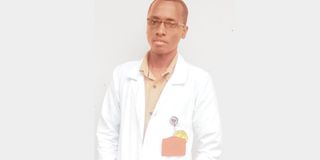When the doc is a palm away

What you need to know:
- Recently, when I stumbled on a Tanzanian website, www.daktarimkononi.com, I was amazed at how local medical scientists are becoming innovative day by day.
As technology advances, you don’t need to keep nagging doctors at clinics whenever you have simple matters; such as asking one question after the other. A doctor is right there in your palm.
Recently, when I stumbled on a Tanzanian website, www.daktarimkononi.com, I was amazed at how local medical scientists are becoming innovative day by day.
Apparently, medical students and senior doctors in Dar es Salaam have teamed up to create an online platform that can be used in solving several problems that have dogged our health system for many years.
The medics, many of them from Muhimbili University of Health and Allied Sciences (Muhas), do it through a website, dubbed, “Dakari Mkononi,” meaning, a doctor in your palm or hand.
Easing the country’s burden
Tanzania is one of the developing countries with plenty of obstacles to overcome—improving the health system being one of the obstacles.
It’s true that there is a big gap to fill, especially now we, as doctors, strive to empower society through positive behavioural change communication.
But, we shouldn’t forget that the disease burden is growing at the pace that needs much of our creativity, intelligence and commitment in an effort to match with it.
This of medical students and doctors online, comes as one key step and at the right time. Every Tanzanian wants to be on internet these days. What a timing!
The number of internet users in Tanzania rose by 16 per cent at the end of 2017 to 23 million, with the majority of those using their handsets to go online, the Tanzania Communications Regulatory Authority (TCRA) said this year.
Yet, internet penetration in the nation of around 52 million people ticked up to 45 per cent in 2017 from 40 per cent a year before, according TCRA.
So, any healthcare investment that aims at reaching these multitudes of Tanzanians on internet must be lauded.
I am aware that Daktari Mkononi is an initiative of medical students. By the way, these are expected to graduate as doctors in near future.
If they don’t stop at this pace, and perhaps bring other students on board, it means that the army of doctors who will be out there educating society will be growing.
They would work to tackle people’s poor and late health seeking behaviour. But also, this would be a key step in curbing long waiting times on queues at health facilities.
There are a lot of misconceptions about health in Tanzania. Largely, ignorance contributes to this trend.
But also, there are just a few interventions that people can learn to adopt, such as taking preventive measures and challenging situations in-case of emergencies at home, work and other environment that might, at times, cost lives or lead to complications.
How it works
Any internet user, by either cell phone or computer can access DaktariMkononi services through the portal, www.daktarimkononi.com. There are well-researched topics on health, which are posted daily.
They aim to enlighten society and people can ask questions on the comment box concerning the ongoing topic. Then, a panel of doctors, nutritionists or pharmacists or dentists give answers in just a few minutes. To ensure that the information given is real and touches the society, the sources are well established and the messages published are peer-reviewed.
Way forward
I am informed that the initiators are determined to grow the initiative on a bigger scale. The first phase seems to be concentrated on this web portal.
As time goes, they may grow into a bigger institution. Who knows?
There will come a time when discussions and debates on health topics will be held to highlight common myths in the society and address misconceptions that affect preventive behaviour and health seeking behaviour.
These shall be conducted with community icons such as popular artists and other non-health personnel. Internet is beginning to revolutionise health in Tanzania, let’s laud these initiatives.
The author is based at the Catholic University of Health and Allied Health Sciences (Cuhas).




